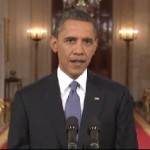al-Qaida on the ropes

Obama will visit troops Thursday at Fort Drum, the upstate New York Army post that is home to the 10th Mountain Division, one of the most frequently deployed divisions to Afghanistan.
He said materials recovered during the raid to get bin Laden showed that the al-Qaida terror network was under deep strain. He said bin Laden himself expressed concern that his organization would be unable to effectively replace senior leaders that had been killed.
The president declared, “We have put al-Qaida on a path to defeat, and we will not relent until the job is done.”
Even after the troops come home, the war will remain expanded on Obama’s watch. He approved 21,000 additional troops for Afghanistan shortly after taking office in 2009, bringing the total number to 68,000. That means he is likely to face re-election with more troops in Afghanistan than when he took office, although he has also dramatically reduced the U.S. footprint in Iraq.
The president spoke for just under 15 minutes from a silent East Room. It was a strategic moment for him to try to explain a turning point in the war effort without elevating it to a major Oval Office address — more of a stay-the-course case of progress and resilience.
“Of course, huge challenges remain,” the president said. “This is the beginning — but not the end — of our effort to wind down this war. We will have to do the hard work of keeping the gains that we have made while we draw down our forces and transition responsibility for security to the Afghan government.”
Significant questions still loom, including whether an Afghan government marred by corruption will be up to enormous job ahead.
Regardless, Obama made clear the United States was ready to move on from a decade defined by wars in Afghanistan and Iraq, at a cost at of thousands of lives lost and more than $1 trillion spent. “We will not try to make Afghanistan a perfect place,” Obama said flatly.
Potential GOP presidential candidates were quick to weigh in with criticism of Obama’s plan — but they did not speak with one voice.
Former Massachusetts Gov. Mitt Romney accused Obama of proposing an “arbitrary timetable” and said the decision on withdrawing troops “should not be based on politics or economics.” Former Utah Gov. Jon Huntsman said the approach in Afghanistan should be focused on counterterrorism, “which requires significantly fewer boots on the ground than the president discussed tonight.”
Republicans critical
Back on Capitol Hill, Sen. John Cornyn, R-Texas, accused Obama of acting based on political considerations. “I am increasingly concerned by the lagging public support for the mission, and it was disappointing that the president failed to bring more clarity to the situation,” he said.
Obama argued that reinforcements he sent have accomplished their mission: eroding the capacity of Taliban insurgents, diminishing the al-Qaida network and providing time and training for Afghanistan’s forces to take charge.
Most Americans oppose the war in Afghanistan and are far more concerned about the teetering economic recovery at home.
Military commanders favored a plan that would allow them to keep as many of the 30,000 surge troops in Afghanistan for as long as possible, ideally through the end of 2012. That timeline would have given them greater troop strength through two crucial fighting seasons.
Obama overruled them.
Many Afghans are eager to see the Americans leave, yet there are big risks for the government there.
“There will be some battles, there will be suicide attacks and bomb attacks,” acknowledged Defense Ministry spokesman Gen. Mohammad Zahir Azimi. “But we in the Afghan forces are prepared to replace the foreign forces, and I’m confident the army has enough capacity and ability.”
U.S officials have been saying for several years that al-Qaida’s safe havens had shifted from Afghanistan to Pakistan. While there has been some success in degrading the terror network in Pakistan, there are still deep concerns among U.S. officials about Pakistan’s commitment to fighting terrorism.
“So long as I am president,” Obama said of Pakistan, “the United States will never tolerate a safe haven for those who aim to kill us. They cannot elude us.”
___
Associated Press writers Robert Burns, Lolita C. Baldor, Matthew Lee and Donna Cassata in Washington and Solomon Moore in Kabul, Afghanistan, contributed to this report.


